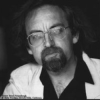Brian Ferneyhough

Brian Ferneyhough
Brian John Peter Ferneyhoughis an English composer, who has resided in California, United States since 1987. His work characterized by highly complex notation and the extensive use of irregular nested rhythmic tuplets, Ferneyhough is typically considered to be the central figure of the New Complexity movement. Ferneyhough taught composition at the Hochschule für Musik Freiburg and the University of California at San Diego, and currently, Stanford University, and is a regular lecturer in the summer courses at Darmstädter Ferienkurse...
NationalityBritish
ProfessionComposer
Date of Birth16 January 1943
In my own recent String Trio I attempt to superimpose two quite different sets of formal strategies, both of which, ultimately, refer back to historical precedent.
By reason of weird translation, many such sets of instructions read like poems anyhow.
It is still true that it is easier to compose a poem in the form of a manual for adjusting a VCR than it is to write a piece using just tuning as a symphony.
So: we're all tired. Now what? Manuscripts written in Club Med?
The idea of 'machine assemblage' is, especially, very alien to my sensibility, since it suggests a relative indifference of the strata to one another during the process of construction.
I would not say that I was, these days, a 'student' of philosophy, although in my youth I was quite deeply involved with certain aspects of the British pragmatists.
The Western musical canon came about not merely by accumulation, but by opposition and subversion, both to the ruling powers on whom composers depended for their livelihoods and to other musics.
Sometimes one can be so closely involved with things that the larger context is lost to view.
In my model, important interference phenomena arise when individual strata come into contact. These chaotic fluctuations are, I suppose, what my music is really about.
What effect these nine years have had or will have on my composing I really don't know - probably I'll be the last one to find out.
From a previous generation, Zimmermann comes to mind as someone who took a lot of conscious risks upon himself in battling the Angel of History.
I assume that relative ratios between different-length measures are to some significant degree appreciable in and of themselves.
I don't want to seen to be preaching: of course, any artist is free to approach previous materials in any way that seems interesting.